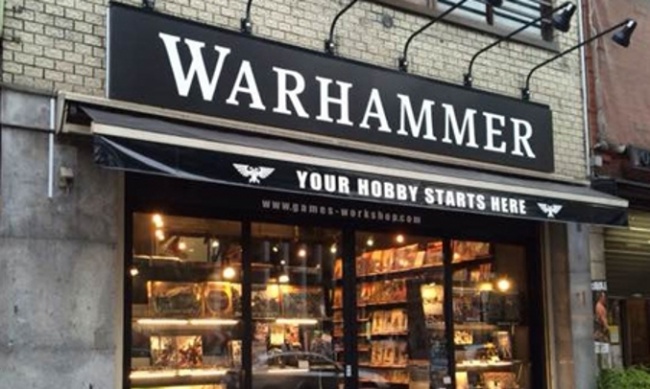Its restructuring largely complete, Games Workshop laid out an ambitious agenda in its annual report, with increasing numbers of rebranded retail stores, a reset of its product mix, and expanded trade sales both to core game stores and other classes of trade.
The expansion of its own store count will coincide with a rebranding of the stores from Games Workshop to Warhammer. “We have taken the decision in the year to rebrand our stores ‘Warhammer,’” CEO Kevin Rountree said in his message to shareholders. “It is what our customers call us.” The process has already begun, with 13 of its stores operating under that brand, and additional stores to be added as new stores are opened or existing stores are refurbished.
Rountree announced that the company plans to open 30 stores worldwide in its 2015/2016 year. “Greenfield” cities in North America and continental Europe are especially targeted. At year-end, the company had 418 stores in 20 countries, with 324 of them in what it calls its “one-man” format and 94 in its “multi-man” format. North America was down nine stores from the beginning of the fiscal year.
Games Workshop is also experimenting with a new format for high traffic locations (sometimes in tourist areas), with higher-end finishes, a new till format, mobile tills, a new web terminal, and next day delivery to the store. The company has one of those stores open in London, and plans new openings for the high end format in Boston, Sydney, Munich, Paris, and Copenhagen in the next year.
The company also plans to expand is sales to independent retailers, with a particular focus on North America. New classes of trade will be targeted, including toy, craft, book, and comic stores.
And coming off the relaunch of its flagship Warhammer Fantasy Battles line (as discussed in this column by Scott Thorne, see “Rolling for Initiative—The Coming of the ‘Age of Sigmar’”), Games Workshop is looking at some major changes in its product line. “I will review our product range,” Rountree said. “We believe this is long overdue: it is time for a resetting of the ranges. Not tweaking here and there but a top down reassessment.”
Rountree assured shareholders that there would be no reduction in retail prices for its products, but said he will “be looking to offer a broader range of price points.”
Other initiatives for the company including expanding and improving its recruitment process for new employees to “industrial scale,” and replacing the company’s ERP system, a project that is expected to cost £6.4 million.
Games Workshop is coming off a year in which its earnings per share went up over 50%, albeit on sales that were down about 4%. The declining sales were largely the result of the restructuring of its retail operations, which closed larger locations and replaced them with what it calls “one man stores,” which have limited hours and have only one employee. The company had warned of the sales decline shortly after the end of its year, on May 31 (see “Games Workshop Says Sales Down”). The first half of the year showed a 6.6% decline in sales (see “Games Workshop Stores Decline, as Independent Retailers Grow”)
Sales in Games Workshop’s own stores were down 2% in North America and 15% in continental Europe, with a 5% decline overall. Games Workshop’s mail order business was up slightly.
Its trade sales (sales through stores other than its own) were up 8% in North America, but down 12% in the UK and continental Europe for a 6% decline overall.
Games Workshop stock went on a tear after the announcement, and was up 9% since the day before it was released as of August 20. Investors must have liked the big increase in profits and the company’s plans for the future, which are dramatic.








